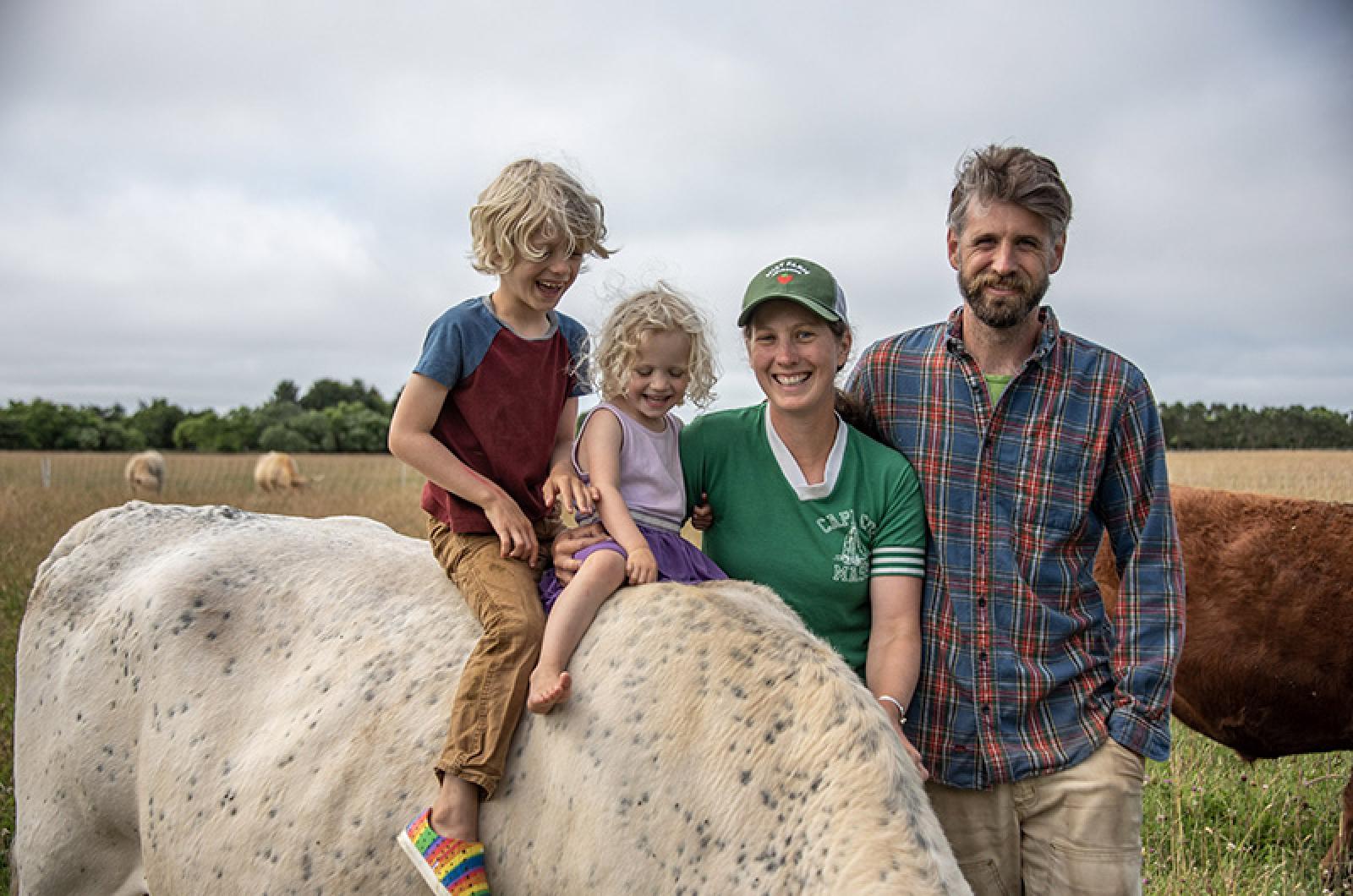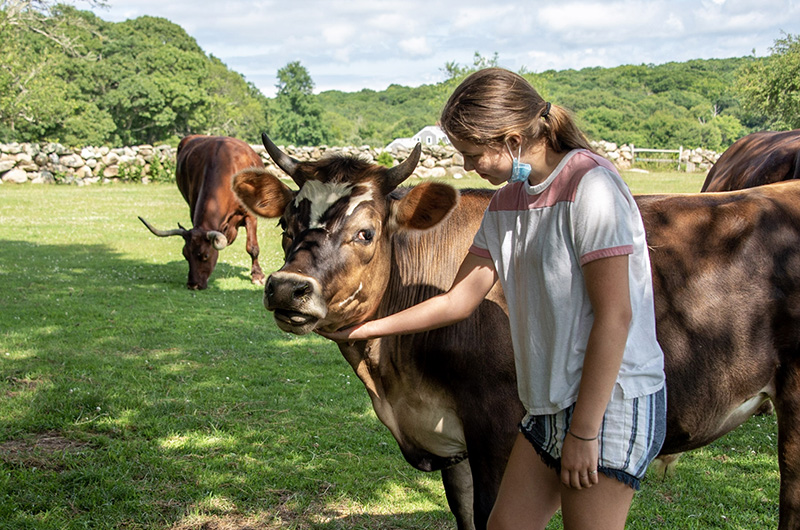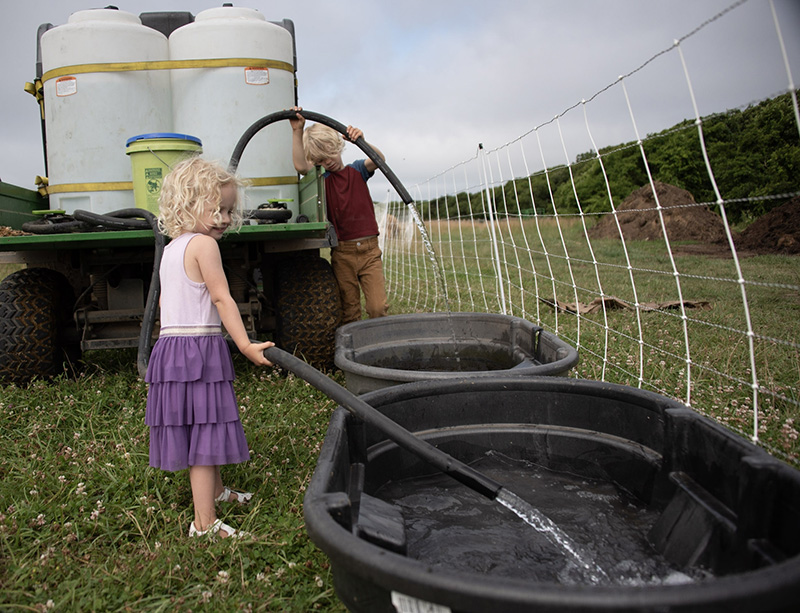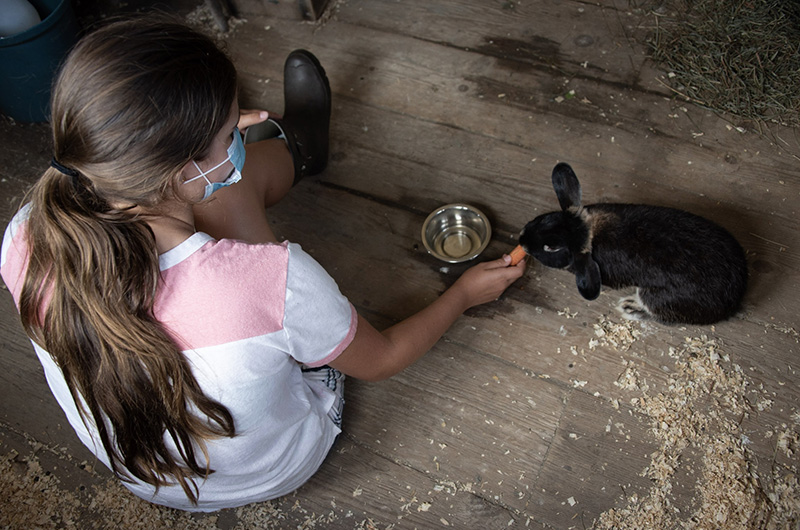When the pandemic hit, six-year-old Henry Scott was in kindergarten at the Martha’s Vineyard Charter School and two-year-old Deirdre Scott was in preschool at First Light Child Development Center in Vineyard Haven.
Their parents Julie and Laine Scott, were working their day (and night) jobs as farm managers at Slough Farm where the family lives.
Now the kids would be home all day. But what is farming if not adapting to the situation at hand? Julie and Laine would just take the kids along on farm chores.
“We did do some switching off and tag-teaming,” Julie said. But for many hours of the day, the kids were with one or both of them. “The pandemic definitely changed their world,” she added.
From the looks of things when I visited the family this week, everyone has flourished, including the 15 beef cattle (mostly heritage breed), 25 sheep, nine goats, 80 meat birds, 50 laying hens, 15 turkeys, four kittens, one cat and one dog. And the handsome vegetable garden, where Laine has introduced regenerative gardening to improve the health of the soil. Slough Farm (slough rhymes with plow), a nonprofit farm at Katama that launched educational programs before the pandemic arrived, donates much of its produce to Island organizations which distribute food to the hungry.
Laine and Julie, who met in California 13 years ago, both have backgrounds in livestock management — Julie at the Farm Institute for seven years and Laine at The Grey Barn and Farm for five years. At Slough Farm they’ve divided up their roles — Julie is the animal manager and Laine is garden manager.
Henry and Deirdre have taken on the serious job of kitten caretaking. When I arrived at the farm, they generously offered Tiger Face and Meep Meep for cuddling. Who doesn’t need a kitten cuddle, especially during a pandemic?
But that’s only the start of the kids’ daily duties.
Everybody rides the golf cart out to the pasture to move the cattle in the mornings. Henry steers the Razor, which Laine has outfitted with water tanks to refill the cattle’s water troughs.
Depending on the pasture, sometimes the Scotts move the cattle again in the evening. With rotational grazing, each section of grassy pasture not only gets time to regenerate before the cattle return to it, but the chickens (in mobile housing) arrive three days after the cows depart to clean up the cow pies, devouring flies, larvae, and other bugs for protein.
The movable fencing is “hot,” and the kids know that, waiting for Mom and Dad to give the word before they move in to visit the cows. They know the mamas by name; Julie bought Xuxu, an American British White Park cow, from the Farm Institute, and she is everyone’s favorite. The photogenic long-haired cattle are the Scottish breed known as Highland. Five of the cows are pregnant.
After the cattle move, Laine hitches up the mobile Shade Haven (essentially a giant umbrella on a trailer) and tows it to the new pasture. Riding the trailer is probably Henry and Deirdre’s favorite part of the morning chores, though they also enjoy filling up the water troughs and checking in with the goats and sheep that are hanging with the cattle.
But even before the pandemic, Henry and Deirdre got a jump start on animal husbandry. Julie is also vice president of the Martha’s Vineyard Agricultural Society and spearheaded the return of a national 4H chapter to the Island. She oversees the youngest group of 4H kids on the Island — the Cloverbuds (ages five to eight) — who until March were meeting at Slough Farm once a week.
Now that nanny Emily Gechtman has arrived for two months, Julie and Laine have more hours in the work day without the kids on hand. Who knows what lies ahead for September. But at this point, the imprint’s been made.
“I think they first really bonded with the animals when we had to bottle-feed a lamb,” Julie said.
“And now they’re outside all day long,” Laine added. “I live vicariously through them,” he added.
There’s a special joy in watching kids experience both the freedom of being outside and the self-esteem boost that comes from caring for a farm animal. It’s something unique to a rural environment like the Vineyard, and one more way our lives here, for better or worse, can buffer a seismic shock like the one we’ve experienced in recent months. There is a reassuring routine to farm life: animals must be fed and cared for, food must be raised and processed.
At the other end of the Island on Middle Road in Chilmark, fifth grader Reed Cabot has been caring for one-year-old oxen Spot and Sparkle since they were babies. Born at Mermaid Farm across the street, the two male cattle would have faced a different destiny on the dairy farm (where cows of the female gender are obviously a bit more useful!) if they hadn’t been chosen to move across the street and join Buddy and Boy, the famous pair of 20-year-old oxen who fascinate passersby. Oxen are castrated male cattle that are trained to be draft animals; there is a long history of their productive contribution to the Vineyard.
Reed met Spot and Sparkle when they were a week old. “I’d go visit them and they’d start licking me,” Reed told me when I visited her at Brookside last week. “And then one day they were over here and I was asked to bottle-feed them and it was super fun.”
Since then, Reed’s mom Nicole has been dropping Reed off at the farm every day after school. Amazingly, Reed’s grandmother Nancy Cabot used to visit Brookside Farm after school when she was young. It was a dairy farm then, and Nancy would help put the caps on the milk bottles.
For Reed, the best part about the time she spends at the farm is watching Spot and Sparkle grow up. They have different personalities, she explained. “Spot thinks he’s a dog. He follows you around and licks you. Sparkle acts tough but he’s really kind of shy.”
The two young oxen love each other and didn’t want to leave each other’s side when they first went out to graze in the pasture, Reed noticed. Now they are more confident.
Even the casual observer can see that Reed has accomplished something with her gentle and quietly friendly approach to the animals. She has socialized them. She walks with them, talks to them, pets them and nurtures them, and they respond to her with cow kisses and loyal company.
Reed loves all animals, she said, and can see herself being an animal farmer some day. She loved studying Beluga whales at the Chilmark School, at home she has dogs and chickens, and she recently received a lop-eared bunny named Chip as a present from Hilary Blocksom, Brookside Farm’s longtime caretaker. Chip lives in the barn at Brookside, where Reed stops in every day to pet Chip and give him carrots before heading out to greet the oxen.
It’s not clear when or if Spot and Sparkle will be trained as a working team, but their first star turn may be entering this year’s virtual Ag Fair. Reed will help ready them for a video appearance — the virtual runway to show off their stuff. Whether or not a blue ribbon will ensue is no matter; Reed’s love for Spot and Sparkle is steadfast.










Comments
Comment policy »